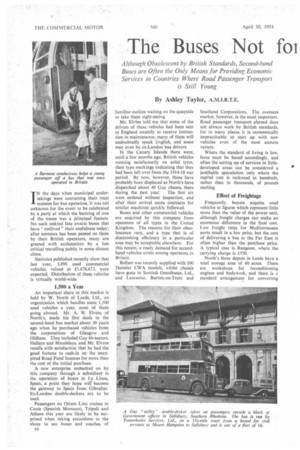The Buses Not foi
Page 98

If you've noticed an error in this article please click here to report it so we can fix it.
By Ashley Taylor, A.M.I.R.T.E.
IN the days when municipal undertakings were converting their tram systems for bus operation, it was not unknown for the event to be celebrated by a party at which the burning of one of the trams was a principal feature. No such unkind fate awaits buses that have " outlived" their usefulness today; after sentence has been passed on them by their British operators, many are greeted with acclamation by a less critical travelling public in some distant clime.
Statistics published recently show that last year, 3,890 used commercial vehicles, valued at £1,676,673, were exported. Distribution of these vehicles is virtually world-wide.
1,500 a Year An important share in this market is field by W. North of Leeds, Ltd., an organization which handles some 1,500 used vehicles a year, most of them going abroad. Mr. A. W. Elvins, of North's, made his first deals in the second-hand bus market about 30 years ago when he purchased vehicles from the corporations of Glasgow and Oldham. They included Guy 66-seaters, Halleys and Maudslays, and Mr. Elvins recalls with satisfaction that he had the good fortune to cash-in on the unexpired Road Fund licences for more than the cost of the initial purchase.
A new enterprise embarked on by this company through a subsidiary is the operation of buses in La Linea, Spain, a point they hope wilt' become the gateway to Spain from Gibraltar. Ex-London double-deckers are to be used.
Passengers on Orient Line cruises to Ceuta (Spanish Morocco), Tripoli and Athens this year are likely to be surprised when taking excursions to the shore to see buses and coaches of F6 familiar outline waiting on the quayside to take them sight-seeing.
Mr. Elvins told me that some of the drivers of these vehicles had been sent to England recently to receive instruction in maintenance; many of them will undoubtedly speak English, and some may even be ex-London bus drivers,
In the Canary Islands there were, until a few months ago, British vehicles running satisfactorily on solid tyres, their type markings indicating that they had been left over from the 1914-18 war period. By now, however, these have probably been displaced as North's have dispatched about 40 Guy chassis there
during the past year. The first six were ordered without inspection, and after their arrival more contracts for similar machines quickly followed.
Buses and other commercial vehicles are acquired by this company from operators of all types in the United Kingdom. The reasons for their obsolescence vary, and a type that is of diminishing efficiency in a particular area may be acceptable elsewhere. For this reason, a ready demand for secondhand vehicles exists among operators in Britain.
Belfast was recently supplied with 100 Daimler CWA models, whilst chassis have gone to Scottish Omnibuses, Ltd., and Lancaster, Burton-on-Trent and
Southend Corporations. The overseas market, however, is the most important. Road passenger transport abroad does not always work by British standards, for in many places it is economically impracticable to start up with new vehicles even of the most austere variety.
Where the standard of living is low, fares must be based accordingly, and often the setting up of services in littledeveloped areas can be considered a justifiable speculation only where the capital cost is reckoned in hundreds, rather than in thousands, of pounds sterling.
Effect of Freightage
Frequently, buyers acquire used vehicles at figures which represent little more than the value of the power unit, although freight charges can make an enormous difference in the final cost. Low freight rates for Mediterranean ports result in a low price, but the cost of delivering a bus to the Far East is often higher than the purchase price. A typical case is Rangoon, where the carrying charge is £550.
North's three depots in Leeds have a total storage area of 40 acres. There are workshops for reconditioning engines and bodywork, and there is a standard arrangement for converting




















































































































































































































































